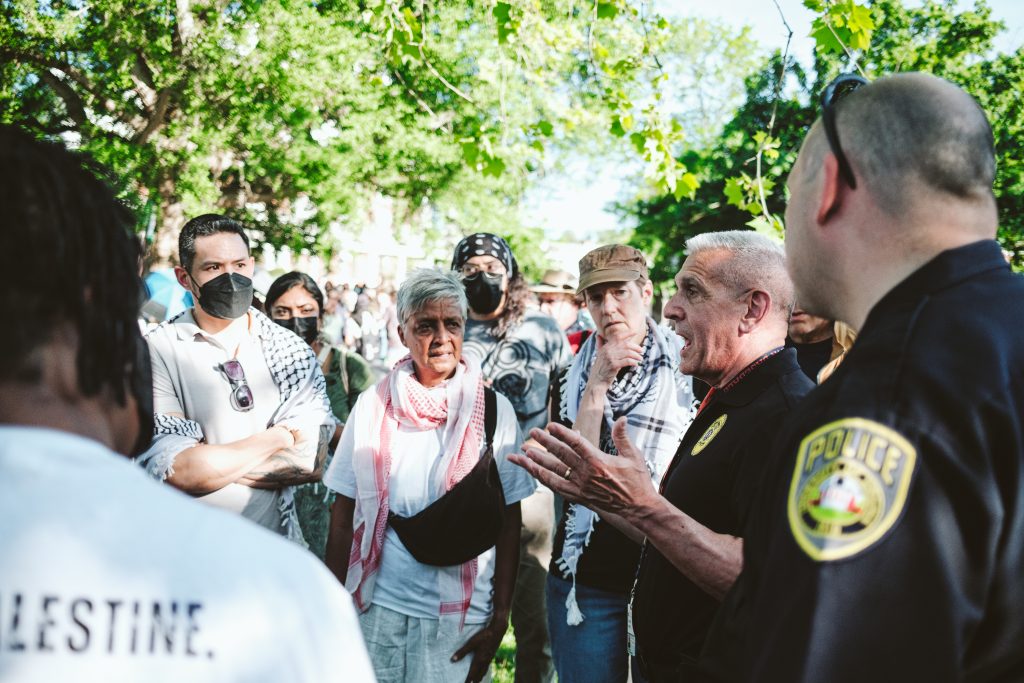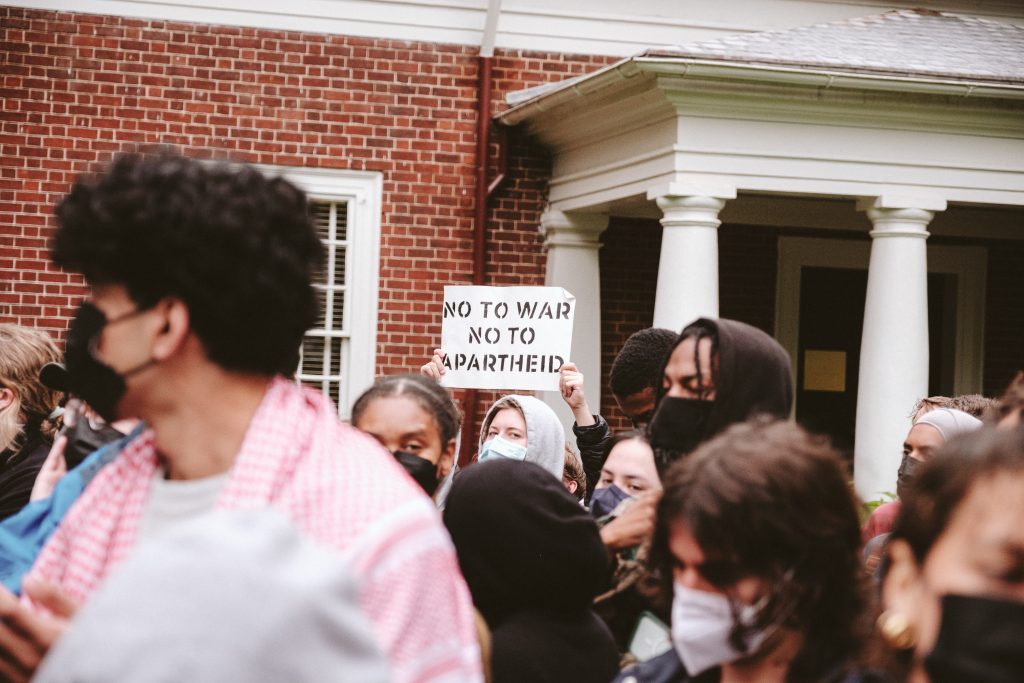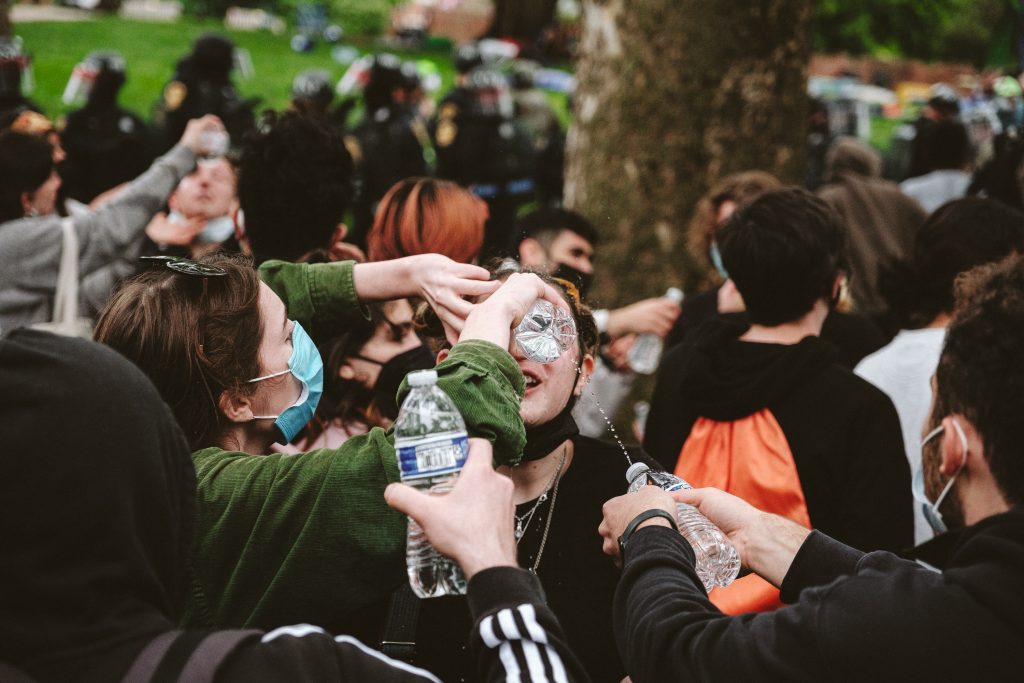Tensions between organizers and university leadership reached a boiling point underneath the gray skies on Saturday, May 4, when police forcefully broke up a pro-Palestine encampment at the University of Virginia.
By all accounts, the UVA Encampment for Gaza organized peacefully on Grounds, with demonstrators intermittently chanting, decorating signs, and working on their finals throughout the week. But by noon on Saturday, UVA officials were instructing students to avoid the area around the University Chapel and Rotunda due to “police activity.” The gathering, which quickly garnered attention and attracted hundreds more to the scene, was declared an unlawful assembly. Streets were blocked off and traffic lights switched to flashing yellow as Virginia State Police officers in full riot gear surrounded the encampment.
For the organizers on the scene, it was clear that they were about to be forcefully dispersed.
Footage and images from bystanders and protesters at the conflict’s inflection point depict heavily armed officers breaking up the encampment with the use of chemical irritants and riot shields. Videos posted to the @uvaencampmentforgaza Instagram page show police encircling a line of protesters linking arms and holding umbrellas before forcefully separating them using shields and tear gas. As of press time, 25 people have been arrested and released on bail in connection with the encampment according to UVA.

Rising action
The escalation at the UVA encampment comes on the heels of weeks of unrest at college campuses across the country. Students and community members in Charlottesville in particular have been organizing peacefully for months, with events like teach-ins, poetry readings, and demonstrations held by various groups concerned about the Israeli offensive and conditions in Gaza.
Pro-Palestine protesters have broadly condemned the Israeli offensive in Gaza, which has killed more than 34,000 people according to the Gaza Ministry of Health. Israel’s offensive was prompted by the October 7 attacks of Gaza-based terrorist organization Hamas, which killed roughly 1,200 people and saw hundreds taken hostage.
Organizers at UVA first started congregating near UVA Chapel in the evening of Tuesday, April 30, setting up an encampment and calling for a ceasefire in Gaza, Palestinian liberation, and action from the University of Virginia. According to a statement from University Communications, organizers were told they could not set up tents due to school policy at this time, and protestors complied with the policy.
The next day, UVA Dissenters and the UVA Apartheid Divest Coalition held a demonstration on the Lawn from 11am to 5pm. At the end of the event, the group quickly picked up and left the Lawn, with some gathering at the encampment in the green space nearby.
Numbers at the protest ebbed and flowed throughout Wednesday, but by early evening roughly 100 protesters remained, spread out on blankets and towels, crowding under trees to escape the intense heat.
Meanwhile, other students continued their day-to-day activities—taking graduation photos by the Rotunda, setting up slack lines near the Homer statue, and lounging in the grass.
A small counter-protest group gathered nearby for a short period but dispersed quickly.
Protesters declined to speak with the media at the encampment but led chants condemning Israel and UVA: “One, two, three, four, occupation no more. Five, six, seven, eight, UVA, you can’t wait” and “Israel, you can’t hide, you’re committing genocide.”
During a dialogue between concerned faculty members, University Police Chief Tim Longo, and other UVA officials overheard on Wednesday, all expressed a desire to keep the situation from escalating. University police started to remove one organizer for using a megaphone without a permit, but the situation quickly resolved.
“[The attendees are] committed to a kind of constantly mobilized, constantly negotiated, incredibly beautiful and peaceful protest,” one faculty member told C-VILLE. “They’ve been gentle, they’ve been open, they’ve come from every community in the U.S. to actually argue for something and speak and stand for something, which is to stop genocide.”

Photo by Eze Amos.
Call and response
Throughout the week, the encampment gradually shrank in size. Organizers posted their demands both on Instagram and on the Homer statue on Thursday: continuously disclose investments made by the UVA Investment Management Company, divest from “institutions materially supporting or profiting from Israel’s genocide, apartheid, and occupation of Palestine,” permanently cut ties with Israeli academic institutions, and allow faculty and students to support Palestine without risk of disciplinary action.
UVA responded to the demands the next day, outlining the processes for UVIMCO decisions and emphasizing its support for free speech on Grounds, while indicating it would not cut ties with Israeli academic institutions.
“Your request for permanent withdrawal from academic relations with Israeli institutions is not one we can support,” wrote Vice President and Chief Student Affairs Officer Kenyon Bonner and Vice Provost for Academic Affairs Brie Gertler in a letter released Friday, May 3. “To terminate study abroad programs, fellowships, research collaborations, and other collaborations with Israeli academic institutions would compromise our commitment to academic freedom and our obligation to enabling the free exchange of ideas on our Grounds, both of which are bedrock values of the University.
“We recognize that this is an incredibly difficult moment for our world. We are seeing disturbing images of arrests and bitter division on campuses across the country. The staggering loss of innocent lives as a result of the conflict in the Middle East is heartbreaking,” reads the final paragraph of the university’s response. “Throughout these times, members of our community have shown a willingness to engage, to debate, and to respect and care for one another and the University we call home, and we hope that you will be willing to participate in further discussion on the issues you’ve highlighted so that we can better understand one another.”
Those at the encampment dissented, posting images of the letter with the words “BULLSHIT” and “FREE PALESTINE” written in marker over the response. Attendees started setting up tents later Friday evening.
Friday night, UPD officers arrived at the encampment in response to megaphone usage and tents before leaving. “Given continued peaceful behavior and the presence of young children at the demonstration site, and due to heavy rain Friday night, officials allowed the tents to remain overnight,” said UVA in an official statement on Saturday, May 4.
Recreational camping tents were exempt from university tent regulations according to a UVA website which was changed the morning of May 4, shortly before VSP raided the protest.
Accounts of the escalation vary significantly.
“We hoped and tried to handle this locally. But when UPD’s attempts to resolve the situation were met with physical confrontation and attempted assault, it became necessary to rely on assistance from the Virginia State Police,” said UVA President Jim Ryan in the May 4 statement. “I recognize and respect that some will disagree with our decisions. This entire episode was upsetting, frightening, and sad.”

A statement from the University Communications elaborated on this claim by Ryan, reporting that “around 11:45 a.m. [on Saturday], the University Police Department announced again that the group was in violation of University policies and gave them 10 minutes to vacate the premises. Authorities were again met with agitation, chanting and violent gestures such as swinging of objects.”
Allegations of violence by protesters have been refuted by the encampment. “Welcome to the University of Virginia, where we encourage free speech unless you’re protesting genocide,” posted @uvaencampmentforgaza on Instagram on Monday, May 6. “Where we brutalize our students and mace our community members, where we will arrest your friends and call in militarized troopers when anyone threatens our profit.”
Not over yet
The forced removal of the encampment and arrest of protesters has rallied support among the university and broader Charlottesville community. Hundreds gathered on the Lawn on Sunday, May 5, with several student groups issuing open letters of support for organizers and condemning UVA’s deployment of law enforcement.
“We categorically REJECT President Jim Ryan’s comments and subsequent explanations regarding the events of May 4th,” shared Muslims United, the Black Student Alliance, Pakistani Students’ Association, Afghan Student Association, Black Muslims at UVA, the Environmental Justice Collective, the Asian Student Union, the Bengali Student Organization, and the Sikh Students Association in a joint statement on Instagram. “His portrayal was based on misrepresentations and biased views. Those who were present at the encampment have attested to its peaceful nature.”
Several other student groups and professors at UVA have since spoken out against the university’s handling of the encampment and students’ arrests.
Sunday evening, approximately 100 organizers went directly to Ryan’s residence at Carr’s Hill, chanting for the president to “drop the charges” against arrested demonstrators. Ryan and Provost Ian Baucom were notably absent during the VSP raid, only issuing statements hours after the scene was declared stable by UVA Emergency Management.
As of press time, UVA has not issued any additional public statements regarding the encampment or police action on Grounds.
